Mutea Iringo is a Kenyan politician who is a former Principal Secretary, Ministry of Interior and Coordination of National Government, to the Cabinet of Kenya. [1] [2]
Mutea Iringo is a Kenyan politician who is a former Principal Secretary, Ministry of Interior and Coordination of National Government, to the Cabinet of Kenya. [1] [2]

A part of Eastern Africa, the territory of what is known as Kenya has seen human habitation since the beginning of the Lower Paleolithic. The Bantu expansion from a West African centre of dispersal reached the area by the 1st millennium AD. With the borders of the modern state at the crossroads of the Bantu, Nilo-Saharan and Afro-Asiatic ethno-linguistic areas of Africa, Kenya is a truly multi-ethnic state.
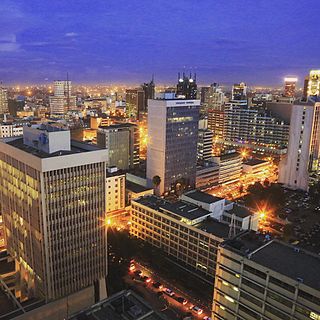
The Economy of Kenya is a market-based economy with a few state enterprises. Major industries include agriculture, forestry, fishing, mining, manufacturing, energy, tourism and financial services. As of 2020, Kenya had the third largest economy in Sub-Saharan Africa, coming behind Nigeria and South Africa.
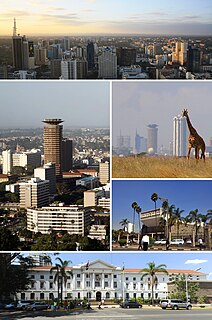
Nairobi is the capital and the largest city of Kenya. The name comes from the Maasai phrase Enkare Nairobi, which translates to "cool water", a reference to the Nairobi River which flows through the city. The city proper had a population of 4,397,073 in the 2019 census, while the metropolitan area has a population of 9,354,580. The city is popularly referred to as the Green City in the Sun.
Kenya Airways Ltd., more commonly known as Kenya Airways, is the flag carrier airline of Kenya. The company was founded in 1977, after the dissolution of East African Airways. Its head office is located in Embakasi, Nairobi, with its hub at Jomo Kenyatta International Airport.

The Mau Mau rebellion (1952–1960), also known as the Mau Mau uprising, Mau Mau revolt or Kenya Emergency, was a war in the British Kenya Colony (1920–1963) between the Kenya Land and Freedom Army (KLFA), also known as the Mau Mau, and the British authorities.

Emilio Stanley Mwai Kibaki better known as Mwai Kibaki, is a Kenyan politician who served as the third President of Kenya from December 2002 until April 2013.

Kenya, officially the Republic of Kenya, is a country in Eastern Africa. At 580,367 square kilometres (224,081 sq mi), Kenya is the world's 48th largest country by area. With a population of more than 47.6 million in the 2019 census, Kenya is the 29th most populous country. Kenya's capital and largest city is Nairobi, while its oldest city and first capital is the coastal city of Mombasa. Kisumu City is the third-largest city and also an inland port on Lake Victoria. Other important urban centres include Nakuru and Eldoret. As of 2020, Kenya is the third-largest economy in sub-Saharan Africa after Nigeria and South Africa. Kenya is bordered by South Sudan to the northwest, Ethiopia to the north, Somalia to the east, Uganda to the west, Tanzania to the south, and the Indian Ocean to the southeast. Its geography, climate and population vary widely, ranging from cold snow-capped mountaintops with vast surrounding forests, wildlife and fertile agricultural regions to temperate climates in western and rift valley counties and dry less fertile arid and semi-arid areas and absolute deserts.
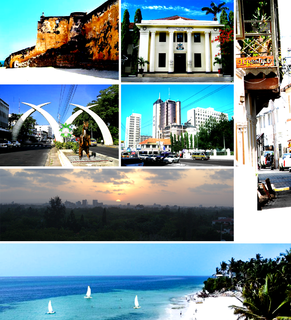
Mombasa is a coastal city in southeastern Kenya along the Indian Ocean. The town is known as the white and blue city in Kenya. It is the country's oldest and second-largest city, with a population of about 1,208,333 people according to the 2019 census. Its metropolitan region is the second-largest in the country, and has a population of 3,528,940 people.
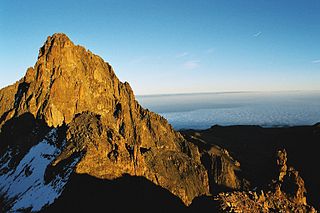
Mount Kenya is the highest mountain in Kenya and the second-highest in Africa, after Kilimanjaro. The highest peaks of the mountain are Batian, Nelion and Point Lenana. Mount Kenya is located in the former Eastern and Central provinces of Kenya; its peak is now the intersection of Meru, Embu, Laikipia, Kirinyaga, Nyeri and Tharaka Nithi counties, about 9 kilometres south of the equator, around 150 km (90 mi) north-east of the capital Nairobi. Mount Kenya is the source of the name of the Republic of Kenya.

The president of the Republic of Kenya is the head of state and head of government of Kenya. The president leads the executive branch of the Government of Kenya and is the commander-in-chief of the Kenya Defence Forces. The official residence of the president is State House, Nairobi.
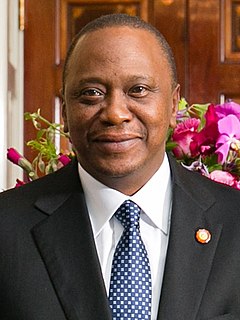
Uhuru Muigai Kenyatta is a Kenyan politician who is the president of Kenya serving since 2013.

The Kenya national cricket team represents the Republic of Kenya in international cricket. Kenya is an associate member of the International Cricket Council (ICC) which has Twenty20 International (T20I) status after the ICC granted T20I status to all of their members.

The Kenya national football team represents Kenya in international football. It is controlled by the Football Kenya Federation, the governing body football in Kenya, and competes as a member of the Confederation of African Football (CAF) and the Council for East and Central Africa Football Associations (CECAFA), a sub-confederation of CAF that has jurisdiction in East and Central Africa. The team is colloquially known as the Harambee Stars and plays its home games primarily at the Nyayo National Stadium in the country's capital, Nairobi. The team is yet to qualify for the FIFA World Cup competition.

The culture of Kenya consists of multiple traditions and trends. Kenya has no single prominent culture that identifies it. Its cultural heritage and modern expressions of culture instead consist of various cultures, shaped and practiced by the country's different communities.

Dr William Samoei Arap Ruto, more commonly known as William Ruto, is a Kenyan politician, serving as Deputy President of Kenya since September 2013.

The Sultanate of Zanzibar, also known as the Zanzibar Sultanate, was a state controlled by the Sultan of Zanzibar, in place between 1856 and 1964. The Sultanate's territories varied over time, and at their greatest extent spanned all of present-day Kenya and the Zanzibar Archipelago off the Swahili Coast. After a decline, the state had sovereignty over only the archipelago and a 16-kilometre-wide (10 mi) strip along the Kenyan coast, with the interior of Kenya constituting the British Kenya Colony and the coastal strip administered as part of that colony de facto.

General elections were held in Kenya on 27 December 2007. Voters elected the President, and members of the National Assembly. They coincided with the 2007 Kenyan local elections.

The Colony and Protectorate of Kenya, commonly known as British Kenya or British East Africa, was part of the British Empire in Africa. It was established when the former East Africa Protectorate was transformed into a British Crown colony in 1920. Technically, the "Colony of Kenya" referred to the interior lands, while a 16 km (10 mi) coastal strip, nominally on lease from the Sultan of Zanzibar, was the "Protectorate of Kenya", but the two were controlled as a single administrative unit. The colony came to an end in 1963 when a black majority government was elected for the first time and eventually declared independence as Kenya.

The counties of Kenya are geographical units envisioned by the 2010 Constitution of Kenya as the units of devolved government. The powers are provided in Articles 191 and 192, and in the fourth schedule of the Constitution of Kenya and the County Governments Act of 2012. The counties are also single-member constituencies for the election of members of parliament to the Senate of Kenya and special women members of parliament to the National Assembly of Kenya. As of 2013 general elections, there are 47 counties whose size and boundaries are based on the 47 legally recognized districts of Kenya. Following the re-organization of Kenya's national administration, counties were integrated into a new national administration with the national government posting county commissioners to represent it at the counties.
The COVID-19 pandemic in Kenya is part of the worldwide pandemic of coronavirus disease 2019 caused by severe acute respiratory syndrome coronavirus 2. The virus was confirmed to have reached Kenya on 12 March 2020, with the initial cases reported in the capital city Nairobi and in the coastal area Mombasa.